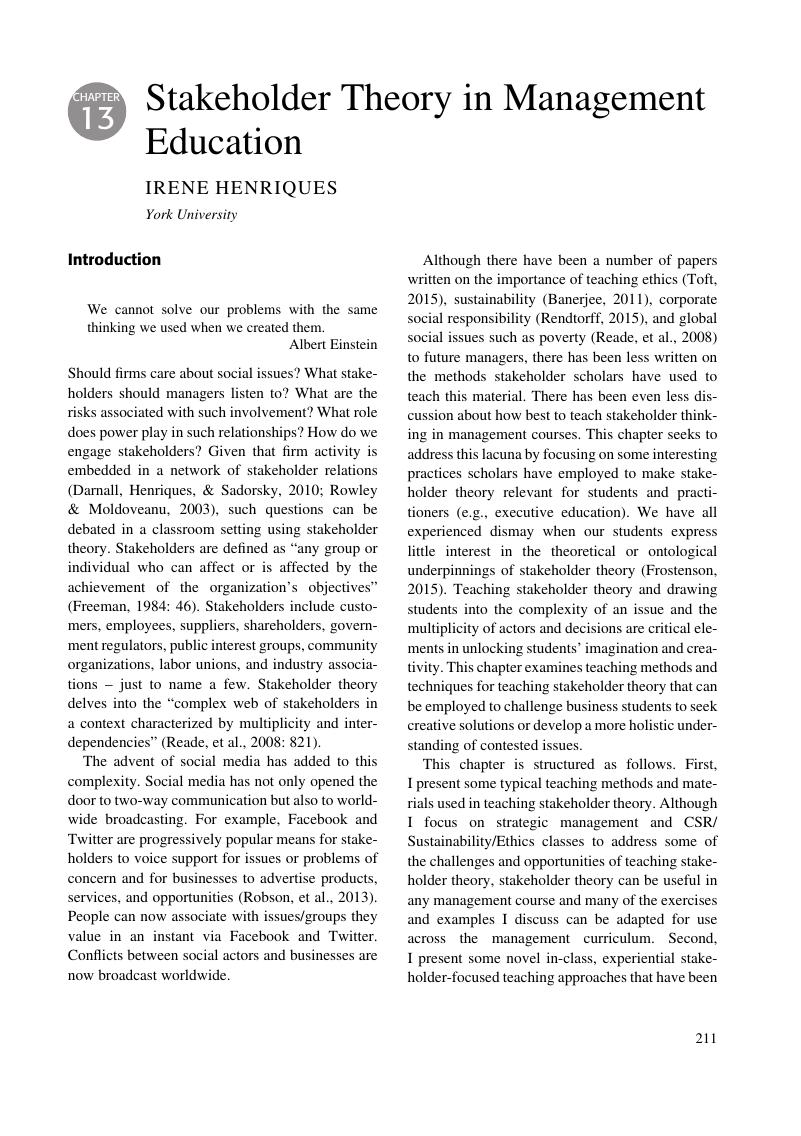from Part IV - Stakeholder Theory in Education and Practice
Published online by Cambridge University Press: 01 May 2019

Video Cases
Seventh Generation Case
This case is accompanied by a teaching note, available to faculty only. Please send your request to freecase@oikosinternational.org. Access to the Guayakí case video hosted by VIMEO is also free and the password is in the teaching note.
For details on how to undertake a stakeholder negotiation exercise with actual stakeholders of a negotiation as coaches see:
Issue-based stakeholder negotiation exercises where actual stakeholder coaches are not present require instructors to choose a local or national issue of significance so as to heighten students’ involvement and interest. The ideal issue is one that is complex and uncertain and has many differing stakeholder perspectives as to how the problem should or should not be addressed. Examples include (1) a major labor disruption that not only affects the company and its primary stakeholders but the community as well; and (2) controversial capital investments including building on rich agricultural land, pipeline expansion, mining expansion, etc. For details on methods to engage students in an issue-based stakeholder negotiation exercise see:
Some examples of historical social protest novels that have led to change include: The Jungle by Upton Sinclair (1906) on the terrible treatment of immigrant laborers in food processing facilities in the United States; The Feminine Mystique by Betty Friedan (1963) on the dissatisfaction of housewives across America; Invisible Man by Ralph Ellison (1947) about societal repression and African American’s community’s resulting frustrations; and Silent Spring by Rachel Carson (1962) on the serious health problems that chemical companies denied. All these novels preceded subsequent changes to the Meat Inspection Act, the Feminist movement, the Civil Rights movement, and the Environmental movement respectively.
For a discussion on how to introduce historical protest novels into a classroom setting and suggestions of social protest novels for a management classroom see:
An issue-based stakeholder town hall is a stakeholder exercise that is based on an issue that has yet to be resolved. The ideal issue is in the news, is complex, involves a company or an industry, has multiple stakeholders with differing perspectives, and is contested.
Below I provide a few examples
Pipeline expansion: Keystone XL Pipeline expansion Resource List
Students are also asked to watch a video made by the Pembina Institute (an environmental non-governmental organization) regarding the Canadian oil sands which can be found at www.pembina.org/pub/1280.
The Dakota Access Pipeline controversy is another example that can be used. For a synopsis of the issues, see the articles by
and
The impact of technology adoption on employment
Concern regarding technology replacing jobs is not news. What is news is the speed at which technology is and will replace jobs as artificial intelligence and robotic automation takes hold. Driverless vehicles, automated kiosks, robo-investing are all examples of this radical transition. This is an ideal, although uncomfortable, topic for management students to discuss. Taking on various stakeholder roles related to this issue would allow students to think through the short-term and long-term implications of an issue that may affect their future.
Suggested readings and videos:
TED-Talks by Andrew McAfee and Erik Brynjolfsson authors of:
To save this book to your Kindle, first ensure no-reply@cambridge.org is added to your Approved Personal Document E-mail List under your Personal Document Settings on the Manage Your Content and Devices page of your Amazon account. Then enter the ‘name’ part of your Kindle email address below. Find out more about saving to your Kindle.
Note you can select to save to either the @free.kindle.com or @kindle.com variations. ‘@free.kindle.com’ emails are free but can only be saved to your device when it is connected to wi-fi. ‘@kindle.com’ emails can be delivered even when you are not connected to wi-fi, but note that service fees apply.
Find out more about the Kindle Personal Document Service.
To save content items to your account, please confirm that you agree to abide by our usage policies. If this is the first time you use this feature, you will be asked to authorise Cambridge Core to connect with your account. Find out more about saving content to Dropbox.
To save content items to your account, please confirm that you agree to abide by our usage policies. If this is the first time you use this feature, you will be asked to authorise Cambridge Core to connect with your account. Find out more about saving content to Google Drive.